The above may take awhile to load but yes, my first book (based on most of my PhD, but not the stats) can now be read on the Internet Archive.
Category Archives: 3D and game editors
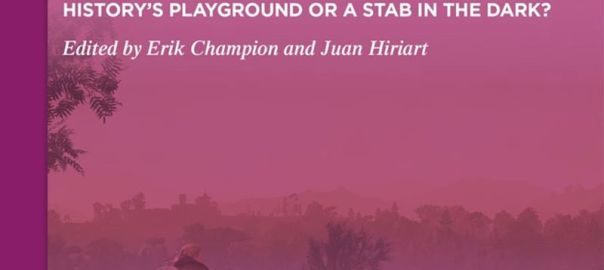
Assassin’s Creed in the Classroom
Assassin’s Creed‹ in the Classroom History’s Playground or a Stab in the Dark? HAS been published by De Gruyter, on 18 December. Thanks to my co-editor Dr Juan Hiriart, and our authors.
https://degruyter.com/document/isbn/9783111250724/html
Erik Champion and Juan Hiriart
Introduction: History’s Playground or a Stab in the Dark?
Marc-André Éthier and David Lefrançois
Chapter 1: Historical Video Games and Teaching Practices
Chu Xu, Robin Sharma and Adam K. Dubé
Chapter 2: Discovery Tour Curriculum Guides to Improve Teachers’ Adoption of Serious Gaming
Ylva Grufstedt and Robert Houghton
Chapter 3: Christian Vikings Storming Templar Castles: Anachronism as a Teaching Tool
Julien A. Bazile
Chapter 4: Ludoforming the Past: Mediation of Play and Mediation of History through Videogame Design
Nathan Looije
Chapter 5: Exploring History through Depictions of Historical Characters in Assassin’s Creed Odyssey
Juan Hiriart
Chapter 6: Empathy and Historical Learning in Assassin’s Creed Valhalla Discovery Tour
Kevin Péloquin and Marc-André Éthier
Chapter 7: The Discovery Tour as a Mediated Tool for Teaching and Learning History
Angela Schwarz
Chapter 8: Discovering the Past as a Virtual Foreign Country: Assassin’s Creed as Historical Tourism
Hamish Cameron
Chapter 9: Classical Creations in a Modern Medium: Using Story Creator Mode in a University Assignment
Kira Jones
Chapter 10: Assassin’s Creed @ The Carlos: Merging Games and Gallery in the Museum
Manuel Sánchez García and Rafael de Lacour
Chapter 11: From the Sketchbook to Assassin’s Creed Valhalla: An Experiment in Architectural Education
Erik Champion
Chapter 12: Assassin’s Creed As Immersive and Interactive Architectural History
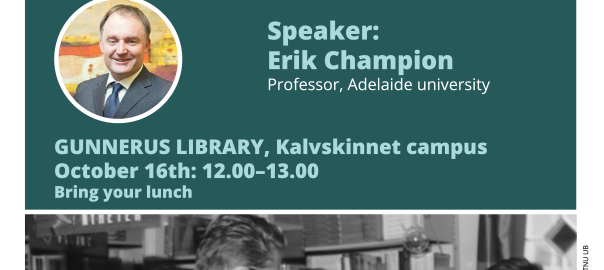
Upcoming talks: Norway Iceland UK
Thanks to echoing.eu and NTNU for inviting me to Europe.
MONDAY 16 October NTNU talk, Gunnerus Library, TRONDHEIM NORWAY 12:00-13:00
LUNCH WITH A WRITER: “PLAYING WITH THE PAST”
The eCHOing project is inviting you to a lunch lecture, join us for an exciting event that explores the fascinating world of visitor experiences in the GLAM sector (Galleries, Libraries, Archives, and Museums). Photo: gunnerus.no NTNU UB
TUESDAY 17 OCTOBER Hands-on Game Design Workshop, TRONDHEIM NORWAY, 09:30-14:30
Join us for an exciting event that explores the fascinating world of visitor experiences in the GLAM sector (Galleries, Libraries, Archives, and Museums).
Whether you’re a student curator, librarian, archivist, or museum enthusiast, this event is a must-attend to stay ahead in the ever-evolving GLAM landscape.
In this half-day workshop Erik Champion will help small groups of 4 brainstorm (“ideate”) ideas to create engaging games using a simplified working definition of computer games, and with the help of physical items. Although these game ideas could eventually become digital games, escape rooms, augmented or mixed reality projects, this introductory workshop will concentrate on creating and testing physical (analogue) demos and simple prototypes. Although Erik’s focus has been on history and heritage games, this workshop will be open to other types of games, but particularly on those where players can learn beyond the game, and where the game is a series of engaging challenges. You may bring your own idea for a game, or develop a game idea on the day in a group. No programming necessary.
- Work in interdisciplinary groups with real life problems
- Be an agent of change as your ideas will help professionals reach a wider audience for their cultural institutions!
- Learn the fundamentals of serious games and why so many fail.
- Discover how paper prototyping in groups can help you quickly create engaging game ideas.
Short bio for NTNU workshop
Erik Champion tutors game jam projects in South Australia at UniSA, and has hosted game design workshops in Australia, Italy, Poland, the United States, Qatar, and Finland, and co-hosted remotely a game design workshop with school children in Rapa Nui (Easter Island) with Dr Juan Hiriart. He is currently working on research projects with Tencent Games and Ubisoft. He wrote Playing With The Past: Into The Future (Springer 2022), and edited the open access book Virtual Heritage: A Guide (Routledge, 2021) and has written books on the intersection between video games and cultural heritage. He has honorary appointments at Curtin, UWA, and ANU and was recently a visiting professor at the University of Jyvāskylā, Finland, a partner of the Centre of Excellence in Game Studies (https://coe-gamecult.org/).
Skills required: none.
The eCHOing project is an EU-funded programme that aims to foster collaboration through open innovation between universities and 29 cultural institutions in five European countries. Don’t miss out on this unique opportunity to gain valuable insights from our invited gaming guru and writer of the book PLAYING WITH THE PAST.
WEDNESDAY 18 October MediaCity, Salford University, MANCHESTER, ENGLAND, UK, 15:00-19.00
Flexible Heritage Games, Extended Reality and Heritage Futures
My talk: Flexible Heritage Games, Extended Reality and Heritage Futures, focuses on XR and escape rooms, what can we learn from them?
Featuring four presentations as part of the Southern Je immersive exhibition.
FRIDAY 20 October, VR Lab, University of Iceland, REYKJAVIK, ICELAND, 14:00-16:00
Linking Digital Heritage, Games and Virtual Tourism: Menningararfur í sýndarheimum – Cultural Heritage in Virtual Worlds Symposium.
This talk will examine how key challenges in digital heritage involving 3D models could be brought to life and re-opened to interpretation by game design, and how game-like interaction could also help increase the richness and immersive qualities of XR (extended reality) and virtual tourism. Can 3D models, the scholarly information surrounding them, and the involvement of the public be brought closer together? And can we harness the speed and complexity of new technologies to ensure both the data and our understanding of that data can be recorded, interpreted, and shared more fairly, openly, and democratically?
Tickets: EVENTBRITE.
The other speakers will be talking on:
a) making digital twins of statues and monuments that can be used for different purposes in preservation and promotion (https://sketchfab.com/ListasafnEinars/models);
b) working with heritage and even heritage artefacts into a computer game https://islandofwinds.com
NB Morning Workshop on game prototyping: to be determined.
MONDAY 23 October Watershed Media Centre BRISTOL, ENGLAND, UK, 18:00-20:00
Screen Tourism and Affective Landscapes Book Launch

WEDNESDAY 25 October School of Journalism, Media and Culture, Central Square, CARDIFF UNIVERSITY, WALES, UK, 16:00-17:15
Reflective Experiences with Immersive Heritage (Difficult Digital Heritage)
Despite the growth and spread of digital humanities visualisation projects, parallel and accessible examples in immersive virtual heritage are harder to find. Over the last three decades, immersive technologies (especially as “new” media) have embraced digital heritage to create spectacular experiences, but existing and durable examples of virtual heritage (virtual reality applied to cultural heritage) are relatively rare, while examples of difficult heritage far rarer. In this talk I will summarize relevant dilemmas in presence research, and recent developments in virtual heritage, reflect on some difficult lessons learnt, and offer some recommendations as to how we could address the depiction or evocation of difficult pasts in the near future.
BIO
Erik Champion is an Enterprise Fellow at UniSA, Emeritus Professor at Curtin University, Honorary Research Fellow at UWA, and Honorary Research Professor at ANU. He has published books and papers on serious games and game mods, virtual heritage, virtual world phenomenology, digital humanities infrastructures, and architectural history.
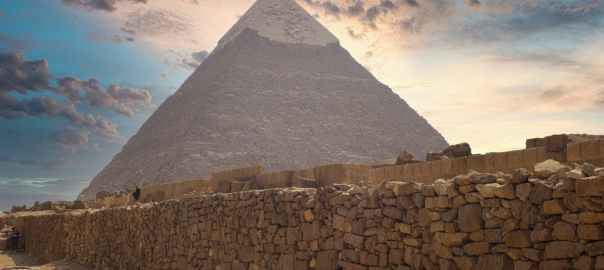
CAA2024 Session on Archaeogames
#CFP did I mention Dr Juan Hiriart and I are organizing an archaeogames session? @CAA2024AKL in Auckland New Zealand, 8-12 April? No?
Paper deadline: 19 October.
Venue: Built on the embers of my old condemned student flat.
URL: https://2024.caaconference.org/sessions/#S12
Keywords: #caa #archaeology #games #reuse #auckland #newzealand
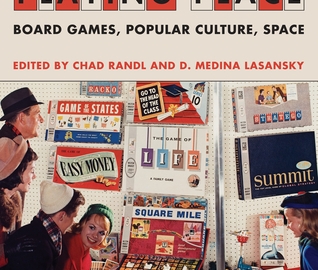
Playing Place: Board Games, Popular Culture, Space
Playing Place: Board Games, Popular Culture, Space
will be released tomorrow by MIT Press.Dr Juan Hiriart and I have a chapter in it:
Workshopping Board Games for Space Place and Culture.
Full reference:
E. Champion and J. Hiriart. Workshopping Board Games for Space Place and Culture. In: Playing Place: Board Games, Popular Culture, Space, edited by C. Randl and D. M. Lasansky. MIT Press 2023. ISBN: 9780262047838.

New article out: 3D & Panoramas
OA paper written with Dr Hafizur Rahaman and Dr David McMeekin on panorama +3D tools! “Outside Inn: Exploring the Heritage of a Historic Hotel through 360-Panoramas” in MDPI Heritage: Special Issue Photogrammetry, Remote Sensing and GIS for Built Heritage.
This research project investigates the potential of 360-panorama tours to improve the situated and contextual interpretation, virtual visitation, and spatial understanding of recorded or simulated built heritage sites. Our chosen case study was the Subiaco Hotel, a significant heritage building designed by Summerhayes Architecture, which we documented using 360-degree photographs and linked with other media to create an interactive 360-panorama tour. Today, 360-degree panorama tours such as Google Street View enable the virtual exploration of heritage sites and historic buildings. They demonstrate limited interaction and immersion across a range of platforms and devices, without the requirement of expensive virtual reality headsets, but typically do not integrate other media to leverage spatially richer ways to communicate the historical developments of architectural interiors and exteriors. The primary goals of this study were to establish a comprehensive step-by-step workflow for creating an interactive tour of a significant heritage site, demonstrate how other media such as text, videos, and 3D models can be linked, gather feedback from cultural heritage professionals, and offer future research directions and development guidelines. Apart from detailing an optimized workflow for developing interactive 360-degree virtual tours for heritage buildings, we also offer guidelines for optimal panoramic tour creation and implementation.
Keywords: 360-panoramas; heritage; virtual tour; historic hotel; Summerhayes Architecture; Subiaco Hotel; heritage interpretation; conservation; workflow; linked data
URL: https://mdpi.com/2571-9408/6/5/232 and PDF: https://mdpi.com/2571-9408/6/5/232/pdf
CITE: Rahaman, H.; Champion, E.; McMeekin, D. Outside Inn: Exploring the Heritage of a Historic Hotel through 360-Panoramas. Heritage 2023, 6, 4380-4410. https://doi.org/10.3390/heritage6050232
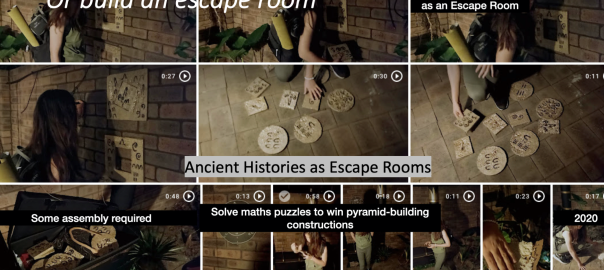
Escape Room Archaeology
Next project: edited collected chapters (free online): DIY archaeology (history, architectural/art history and heritage) escape rooms children/students can create at home or in class (written and illustrated like cookbook recipes). Now, just how to write up the proposal & find the right designers, writers, & experts!

Assassin’s Creed in the Classroom: History’s Playground or a Stab in the Dark?
I am very close to submitting to a publisher the edited book (with Dr Juan Hiriart, University of Salford, UK) “Assassin’s Creed in the Classroom: History’s Playground or a Stab in the Dark?” with 18 writers from history, archaeology, architecture, art history, classics, game design, and education. Thanks to Maxime Durand and Ubisoft for helping getting the party started.

Talk in Iceland, June 16.
I wish! (Well, hopefully next year)… but anyway, I will give a 20-25 minute talk by Zoom, on Thursday June 16. The PHIVE conference (PROMOTING HERITAGE IN VIRTUAL ENVIRONMENTS) is kicked off by the President of Iceland, a noted Professor of History, and a few months older than me (so I still have time to become a head of state).
Title
Into the Heritage-Verse
Abstract
Proponents of virtual reality, extended reality, and the “Metaverse’ suggest the digital future of multiple entertainment and education worlds is imminent. And the field of virtual heritage (virtual reality and related technologies) is arguably over three decades old already.
If this is true, and given that we are saturated by phone-media, apps, and games, why is it so hard to find example of virtual heritage? What is stopping the uptake of these new technologies? And how can we use these new, imminent, and hyped devices and platforms for the benefit of digital heritage, or are there conceptual challenges still to be resolved?
Swords Sandals and Selfies
An abstract from a draft chapter. I have written the chapter but hope to revise it further. It is for a book entitled Screen Tourism and Affective Landscapes, out, I hope, early 2023.
The prospect and potential of videogame-induced tourism has only recently been discussed in academic publications. I will examine three possible reasons why, I will provide evidence to the contrary, and suggest new developments that may accelerate the impact of videogames on tourism (and the related experiencing of affective landscapes). My main case study will be Assassin’s Creed: Odyssey. This 2019 game draws the player into the exploration of idyllic and war-torn historic and mythic landscapes of Athens and Sparta, via questing and simulated violence. It also features a non-violent “Discovery” mode, photographical functions, and a Story Creator mode allowing quests (and in-game photos) to be designed and shared with other players. Beyond violent gameplay, Assassin’s Creed: Odyssey allows the exploration of idyllic historic landscapes and heritage sites. Given the company employs both high-quality designers and professional historians (and archaeologists), we can employ such sandbox games as both a pre-visitation visualisation tool and as a hybrid fictional and yet also factual learning environment.

Immersive Challenges for Museums & Heritage Sites
I will give a talk tonight via Zoom to UniSA IVE colleagues on the above topic.
Time: 4PM
2022 IVE Research Seminar Series
Please join our next IVE Seminar.
Presenter:
Prof. Erik Champion
Enterprise Fellow, UniSA Creative
Title:
Immersive Challenges for Museums and Heritage Sites
Abstract:
This talk will cover recent and persistent challenges facing museums, practical issues with the implementation of virtual reality, games and gamification, and some case studies exploring potential solutions, particularly in the area of cultural heritage.
Bio:
Erik Champion is currently Enterprise Fellow (Architecture, Creative) at the University of South Australia; Emeritus Professor at Curtin University; Honorary Research Professor at ANU; and Honorary Research Fellow at UWA. He was recently a chief investigator on 4 Australian Research Council grants, Curtin University’s first UNESCO Chair (of Cultural Visualisation and Heritage) and Visualisation theme leader and Steering Committee member of the Curtin Institute for Computation.
https://people.unisa.edu.au/Erik.Champion
Date & Time: 5 April 2022 (Tuesday) 4pm (Adelaide ACST — Australian Central Standard Time UMT +9 hours 30 minutes)
Where: Zoom

Excellent article on Assassin’s Creed (and history)
Well, in French, on Ubisoft’s relationship with historical reconstructions and history-inspired escape rooms:

3D, Maps and DBPedia
The UNESCO Chair of Cultural Heritage and Visualisation (10/2016 – 09/2020) project at https://unesco-chv.curtin.edu.au will be shut down in June 2022.
Before then feel free to look at the online Australian map platform with 3D models, Linked Open Data, DBpedia, open data etc… https://unesco-chv.curtin.edu.au/mapplatform but please allow 20-30 seconds for some of the larger 3D models to load.
It was developed for Ikrom Nishanbaev’s PhD project, (supervised with Dr David McMeekin), the thesis by publication has just been successfully reviewed.
Thank you to Ikrom, David, the GIS and cultural heritage people who provided feedback and the reviewers.
Interesting to note Ikrom started the PhD in humanities then when I left Curtin University he moved to Science and Engineering. So it is arguably a truly interdisciplinary Digital Humanities project.
One of his papers received an award. The papers are listed at:

Book chapters task list
I know I said I was cutting back on book chapters but …
- Champion, E., Nurmikko-Fuller, T., & Grant, K. (2022: invited). Chapter 12 Alchemy and Archives, Swords, Spells, and Castles: Medieval-modding Skyrim. In R. Houghton (Ed.), Games for Teaching, Impact, and Research UK: De Gruyter. Invited. Chapter sent.
- Champion, E., & Hiriart, J. (2022). Workshopping Board Games for Space Place and Culture. In M. Lasansky & C. Randl (Eds.), Playing Place: Board Games, Architecture, Space, and Heritage. Cambridge, Massachusetts, USA: MIT Press. Invited. Chapter sent.
- Champion, E. (2022). Not Quite Virtual: Techné between Text and World. In B. Mauer & A. Salter (Eds.), Reimagining the Humanities. Anderson, South Carolina, USA: Parlor Press. Invited. Chapter sent.
- Champion, E. (2022). Ubisoft’s Archaeology and History-Making: From the Inside. In E. Champion, & J. Hiriart, (Eds.). (2023: in progress). Assassin’s Creed in the Classroom: History’s Playground or a Stab in the Dark? De Gruyter: Video games and the Humanities series.
- Champion, E. (2023). Swords Sandals and Selfies: Videogame Tourism. In E. Champion, C. Lee, J. Stadler, & R. Peaslee. (Ed). (2022: in progress). Screen Tourism and Affective Landscapes. Routledge.
- Champion, E. (2022). Reflective Experiences with Immersive Heritage: A Theoretical Design-Based Framework. In A. Benardou & A. M. Droumpouki (Eds.), Difficult Pasts and Immersive Experiences. London, UK: Routledge. Invited. Chapter sent.
- Champion, E. (2023: pending). Title to be advised. Invited. Games and Geography. Germany, Springer-Nature.
- Champion, E. M. (2023: pending). Digital Heritage Ethics (tbc). In A. Pantazatos, T. Ireland, J. Schofield, & R. Zhang (Eds.), The Routledge Handbook of Heritage Ethics: Routledge. Workshop planned at Cambridge Heritage Research Centre, UK, June 2022. Invited. Still to be completed and reviewed. Invited.

New Book Out In The Wild
I know I have talked about it enough but I finally have a hardcover copy in my hands…

Rethinking Virtual Places
Published by: Indiana University Press

Invited Talk in Austria (virtually)
I’m giving a virtual lecture for DHGraz Wednesday 6 October 2021 (tomorrow): “We’re delighted to welcome @nzerik this Wednesday, who will open our Lunchtime Lecture series with an online talk on “Games as Serious Visualisation Tools For Digital Humanities, Cultural Heritage and Immersive Literacy”
More info: https://informationsmodellierung.uni-graz.at/de/neuigkeiten/detail/article/online-lunchtime-lecture-30.-juni-2021-1200-uhr/
Not recorded but slides are here https://www.slideshare.net/nzerik/games-xr-dhgraz-talk-06102021

Virtual Heritage: A Guide
“Virtual Heritage: A Guide” is published and open access!
Why did we write it? For all those interested in an introduction to virtual heritage, but facing steep purchase costs for academic books, so it is especially suitable for university undergraduate courses. Download what you need, for free.
And given it was written from go to whoa in less than a year and to a tight word limit, I am very grateful to the authors for their time…
Cite: Champion, E. M. (ed.) 2021. Virtual Heritage: A Guide. London: Ubiquity Press. DOI: https://lnkd.in/gNkNWiB. License: CC-BY-NC.
Advisory Board setup
A major game company (I’d say a global company, not in Australia) invited me to quote/ setup an international advisory board in relation to intangible heritage and digital games to meet annually or biannually virtually or in reality. It is a bit of a challenge looking forward to estimate the budget in this time of pandemics, lockdowns, and border control issues.

cfp: Web3D 2021
WEB3D 2021
8-12 November 2021
Virtual Event
The 26th International Conference on 3D Web Technology (Web3D 2021) is organized by the Web3D Consortium and the Institute of Information Science and Technologies (ISTI-CNR). The conference focuses on the 3D ecosystem on the web platform, addressing research, development, and applicative use.
Due to the uncertainties related to the pandemic, the conference will be run as a fully virtual event.
This year’s theme is
::::::::::::::::::::::: A Shared 3D Workspace” ::::::::::::::::::::::::
Working together online has been the staple of this last year. Web3D technologies can create a shared, online workspace, with multiple users able to connect and work together in the same environment.
:::::::::: Conference Tracks
Main Track
The conference seeks to cover the world of 3D on the Web across multiple levels: from low-end layers enabling the use of 3D in browsers to high-level applications. The Main Track is the more technical- and research-oriented part of the conference, focusing on original, innovative content.
Session: Web3D for COVID response
The sudden switch to remote teaching/working/interacting prompted many urgent requests for new tools, systems, and paradigms. And the research community answered.
In this track, we intend to bring to the fore all the work done to virtually shorten the distance across people during the emergency, presenting results, innovative approaches, interaction paradigms, and subsequent evaluations.
:::::::::::::::: Special Track: Digital Fashion in the Web
The future of fashion is presented from Italy, one of the historic centers of fashion. We invite experts in various fields of Fashion who have effectively used Web3D technologies in their research and academic and public educational activities.
In the last years, the Fashion industry has been going through impressive virtualization of its production chain. The Web is a great way to reach the global public: Web3D makes this reaching out interactive.
This special track is dedicated to the results and new challenges to bring the fashion industry in the 3D Web: import of assets, collaborative tools, virtual fashion shows, clothes simulation are just a few examples.
:::::::::::::::: Special Track: Online Legacies and Cultural Heritage
The Cultural Heritage domain is increasingly using Web3D technologies to share data for teaching, research, and dissemination among peers and the general public. In this special track, we seek to explore how 3D web technologies contribute to knowledge production once data have been processed, shared, and used through online platforms. What is the legacy and impact of virtual content in documenting, interpreting, and showcasing Cultural Heritage?
To answer this question, we invite experts in various fields of Cultural Heritage that have effectively used Web3D technologies in their research and academic and public educational activities. Particular emphasis is placed on mobile objects: from archaeological finds to reference collections, up to closed and open online repositories; from pipelines to process 3D models for the Web to visualization and design methods. We are particularly interested in experiences stemming from (but not limited to) scholarly research, teaching, curatorial and museum practices, scientific dissemination, and public engagement in general.
:::::::::::::::: Submissions ::::::::::::::::
Technical Papers
We welcome original scientific works presenting 3D web research and applications, in either Full or Short format (9 or 5 pages, respectively). Submissions will undergo a single-blind peer-review process. Accepted papers will be published in the ACM Digital Library and submitted to major indexing services. Works selected for the Best Paper awards will be invited to submit extended versions to the following journals: Computers & Graphics, Journal of Engineered Fibers and Fabrics, Journal on Computing and Cultural Heritage
Interactive Posters
This year, we would like to push forward the concept of a poster: instead of an A1 sheet of paper, the authors are requested to make the posted available online in an interactive format. Posters are an ideal method to present applicative works, tech demos, ongoing research, applications.
Tutorials
Tutorials are a way to present new tools to students, researchers, and professionals. Short courses, possibly with hands-on examples and interactive materials are encouraged and proposals targeting naïve and entry-level audiences are well welcomed
Industrial Use Cases
Web3D is an ecosystem with a strong Industrial presence. The Industrial Use Cases are a way for companies and practitioners working with Web3D to present their solutions and technologies. An online, interactive version of the submission is encouraged.
Workshops/Roundtables
Web3D conferences have always been an opportunity to connect with other experts. Researchers, practitioners, standard committees, workgroups may propose to organize a workshop on specific themes of interest for the Web3D community. Workshops may be either presentation sessions moderated by workshop organizers or open discussions on a specific topic of interest.
Hanim 3D Competition
Who can create the best animated-to-music 3D humanoid? We seek for talented animators who want to show their work and win a prize by submitting their creations to the competition.
3D Logo Competition
We are looking for talented 3D artists and designers to jazz up the 2021 Meeting!
The logo and its author(s) will be presented at the opening ceremony and will have the opportunity to present their logo to the audience in a short talk.
Submission deadlines:
Papers: July 30
Interactive Posters: September 3
Tutorials: July 30
Industrial Use Cases: July 30
Workshops: July 30
Topics
Topics of interest include but are not limited to:
● HTML5 3D, WebGL, X3D
● 3D data formats, compression, transmission, and streaming
● Web-based rendering, advanced shading
● VR/AR
● 3D content creation, authoring, modeling
● Web-based Geometry Processing
● 3D printing
● 3D API, middleware, toolkits, frameworks
● AI for Web3D
● Human modeling on Web3D
● Semantic Web
● Cloud-based services for large-scale datasets
● Shared virtual spaces, collaborative environments
● Virtual humans, avatars, motion capture
● 3D repositories, marketplaces, asset galleries
● Mobile platforms
● 3D web-based teaching facilities
● Multi-modal 3D interaction paradigms, 3D navigation, gesture, natural interfaces
● Visual analytics
● Diffusion and adoption of 3D Web technologies, comparative studies, historical perspectives, WWW integration
● Novel interactive 3D web applications in all areas and sectors such as entertainment, education, training, cultural heritage, digital twin, medicine, military, smart manufacturing/industry 4.0, information & data visualization, science, geographic information systems (GIS), digital globes, subsurface exploration, and mining, integrated marine data management and visualization, building information modeling (BIM), and architecture.
More information
All the instructions, updates, and the link to the online submission system can be found on the conference webpage:
All questions about submissions should be emailed to program2021@web3d.org
Web3D 2021 Conference Committee
General Chairs: Fabio Ganovelli, Carol Mc Donald
Organizing Chairs: Francesco Banterle, Marco Potenziani
Program Chairs: Marco Callieri, Yvonne Jung
Special Track chairs: Fashion
Yordan Kyosev, Camilla Olson, Emma Scott, Inga Dabolina
Special Track chairs : Cultural Heritage
Loes Opgenhaffen, Martina Revello Lami, Nicolò Dell’Unto

digital games and intangible heritage
If you have or know of digital games that helped in the “regeneration” of intangible heritage, as well as related organizations, projects and websites or organizations, please let me know…I have been asked to present on this topic on Monday 5 July to overseas gaming companies and academics..
Here was my initial beginning list (woefully incomplete but will soon expand):
Heritage organisations
- UNESCO Chairs … I am investigating, most lists of Chairs and Networks are a little out of date and a few seem to have changed or expanded their remit.
- Historic Urban Landscapes [UNESCO-associated]-none I know of use digital games but I think that would be useful…
- ICOMOS none I know of but it is a huge association.
- Europeana/CARARE/ARIADNE are more into digital archives/preservation?
Game organisations
- The International Game Developers Association (IGDA) Serious Games SIG http://www.digra.org/the-association/
- Games For Change (https://www.gamesforchange.org/ Board)
- Digital Games Research Association – DiGRA http://www.digra.org/the-association/chapters/united-kingdom-digra-chapter/
- VSMM http://vsmm.org/ (website has problems, I think I am still on the board of directors and I am not sure what the current status is)
- Serious Games for Cultural Heritage: the GaLA Activities appears to be finished..
Universities Research or Courses
- Skövde seems to be entering this area, Masters degree: Digital Narration: Game and Cultural Heritage https://www.his.se/en/education/game-development/digital-narration-game-and-cultural-heritage-masters-programme-digba/ Academic: https://www.his.se/en/about-us/staff/lissa.hollowayattaway/
- Genoa https://elios.diten.unige.it/members/
- Ball State University IDIA Lab https://idialab.org/services/
- University of York https://idialab.org/services/
- I am not sure they research games but they have employed an RA from this area https://www.qeh.ox.ac.uk/content/oxford-digital-diplomacy-research-group
- Glasgow School of Art MSc Serious Games and Virtual Reality https://www.gsa.ac.uk/study/graduate-degrees/serious-games-and-virtual-reality/
Games
I am going to include Never Alone. There are at least 6-12 in my head that I need to review to see if they really were “regenerating” intangible heritage..